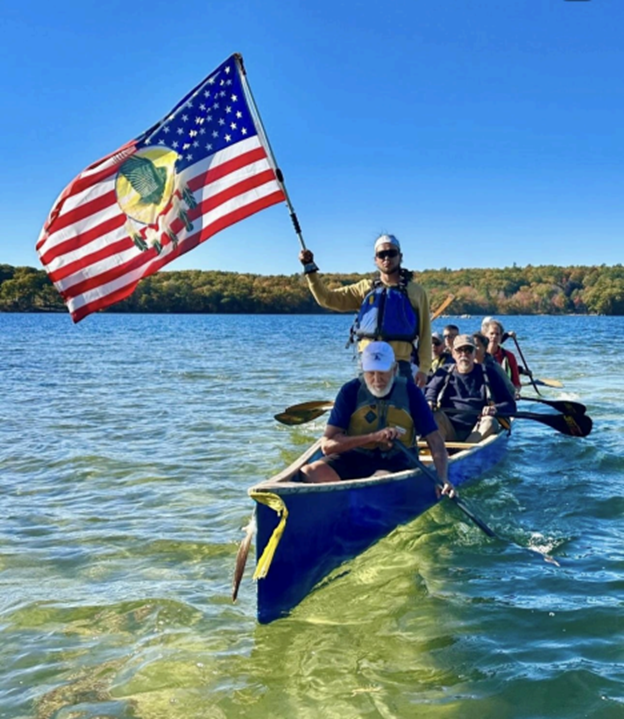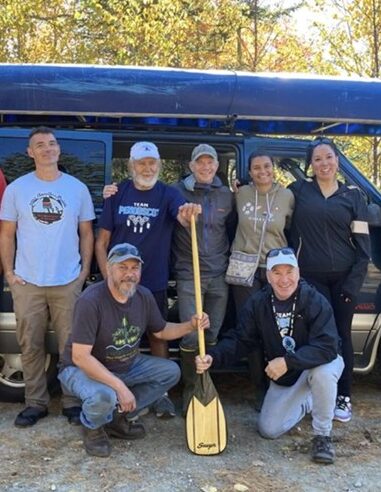Honoring the Ancestors
by Mark Ranco and Kathy Pollard
 If you happened by Bagaduce Falls on the morning of October 18, you might have witnessed an unusual sight: a 28’ foot war canoe filled with people dipping their paddles in unison, making quick progress up the Bagaduce River with the incoming tide! They were taking part in an “Honoring the Ancestors” paddle. Once a throughway for Wabanaki traveling in birch bark canoes that transported them between village sites along the coast and islands, and to hunting, fishing, and gathering places, indigenous canoes have not been on the Bagaduce in centuries.
If you happened by Bagaduce Falls on the morning of October 18, you might have witnessed an unusual sight: a 28’ foot war canoe filled with people dipping their paddles in unison, making quick progress up the Bagaduce River with the incoming tide! They were taking part in an “Honoring the Ancestors” paddle. Once a throughway for Wabanaki traveling in birch bark canoes that transported them between village sites along the coast and islands, and to hunting, fishing, and gathering places, indigenous canoes have not been on the Bagaduce in centuries.
During the colonial era, the chaos of wars between European nations vying to gain control of both the marine and inland resources and territory of what is now Maine, everything changed for the first people who had called the region home for over 13 thousand years–approximately 700 generations of continuous relationship with place. Although Penobscot ancestors tried to protect access to the coast, islands, beloved village sites, and cherished marine food resources for future generations, ultimately they were reduced to just a few hundred from the tens of thousands who thrived along the coast before the arrival of colonists. Following the massacre of Penobscots at a village at Walker Pond’s outlet–the last Penobscot Indian Nation stronghold along the coastal part of their Homeland–survivors were forced to retreat up the Penobscot River to join relatives in Old Town. They could not properly honor those who were killed that day, and not long after, the Phips Proclamation made it even more dangerous to be on the coast. Access was further cut off in the intervening centuries by the divvying up and private ownership of their homeland.
The paddle on October 18 was a long time coming: an historic paddle to retrace one of the ancient canoe routes, and hold ceremony for those whose remains did not receive proper care and respect all those years ago. Most in the war canoe were Penobscot citizens and direct descendants of Penobscots who had lived on the Blue Hill Peninsula and islands, as well as one Passamaquoddy and one Nipmuk paddler, and a couple allies. They could not paddle all the way to Walker Pond but with landowner permission from Sally Mitchell and Crispin Spencer, two longtime supporters and land stewards of BHHT, the paddlers were able to take the canoe out of the Bagaduce.The Rez Dogs drum group, led by Chris Sockalexis, Penobscot Nation Tribal Historic Preservation Officer, sang the paddlers in, a moving moment captured by Sally and Crispin. The war canoe was relaunched at Walker Pond after the group made a brief stop on Caterpillar Hill to hold ceremony near signage that BHHT installed to acknowledge indigenous history of place, and the erasure of what happened just below at the old village site on the pond. Although they were not able to land at the site, for the first time in all these years they held ceremony from the canoe to honor the ancestors who lost their lives.
The group, along with invited guests, then gathered at a private beach on Horseshoe Cove in Brooksville, to enjoy a traditional lobster and clam bake put on by Ann Pollard-Ranco, Penobscot citizen, activist, and chef extraordinaire, with huge help from Ryan Ranco Kelly and his mom Rhonda Sawyer, both Penobscot citizens, along with Ryan’s stepfather Bob Willette who dug the clams, hauled seaweed and buckets of saltwater! It was an incredibly beautiful afternoon; warm sun, calm seas, and a spectacular view to one of the ancient Penobscot navigational landmarks just offshore; Baby Moose Liver Island. For many of the indigenous people who participated, it was the first time they had been able to access this part of their ancestral Homeland, where the remains of a shell midden and an ancient arrowhead found on the beach spoke of a renewal of relationship to place spanning many thousands of years.
Hopefully there will be many more paddles retracing ancient ancestral canoe routes, the sharing of access, new friendships, and ability to enjoy traditional food, long into the future. In the words of Mark Ranco, team leader, “I was grateful for the support shown by funders, Blue Hill Heritage Trust, and local residents. This exemplified that a sense of community extends beyond the current bounds of the Penobscot Nation, to other parts of our Homeland along the coast. For me, it was an honor to retrace the route of our ancestors, a great feeling to know that we were paddling the same waters of my ancestor, the great Indian chief, Madockawando!” Ryan Ranco Kelly commented, “To be standing on a beach, with the aroma of a steamed lobster feast nearly ready, looking at out Nick Nicholas (a Passamaquoddy citizen), as he walks to the point to get closer to Baby Moose Liver Island. Hard to put the appreciative feelings into words.” So much gratitude goes out to all who participated, and to the Morton-Kelly Charitable Trust, who generously supported the paddle and lobster bake; to Blue Hill Heritage Trust as an ally and fiscal sponsor, as well as providing logistical support for the paddle, and to private landowners on the Bagaduce and on Horseshoe Cove for extending hospitality and access. The glow of this day will be with us for a long time.


*Article originally featured in our 2025 Fall Newsletter.